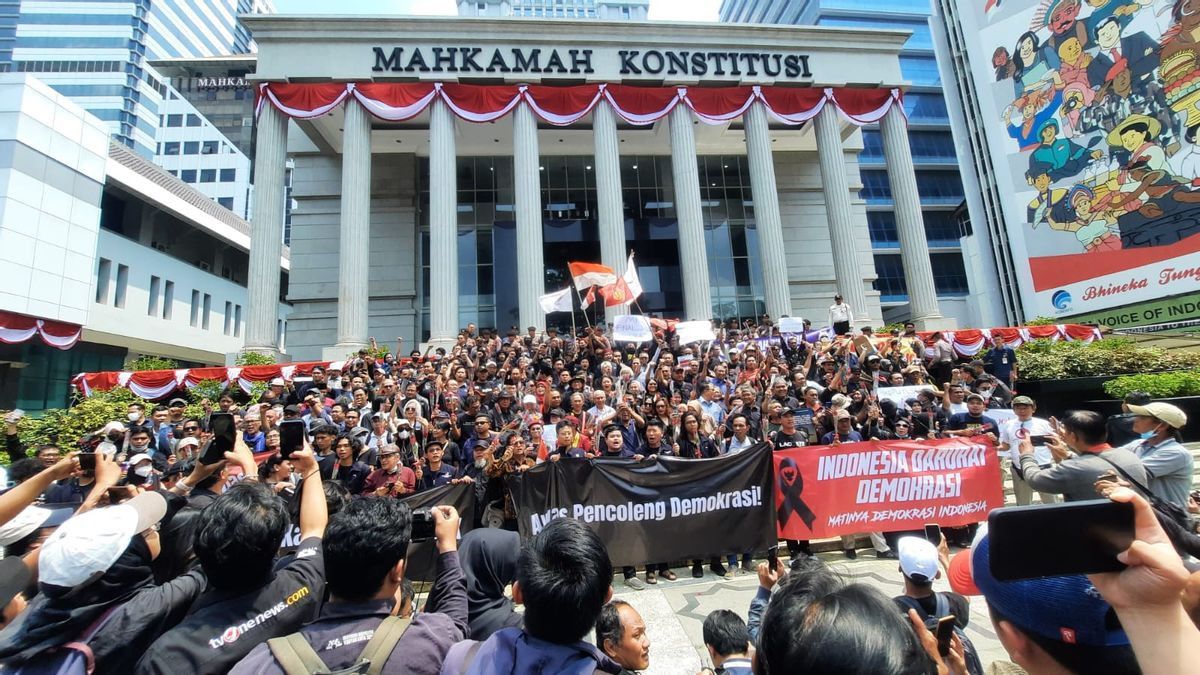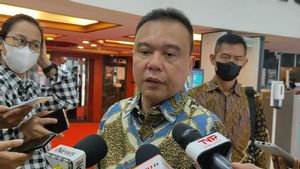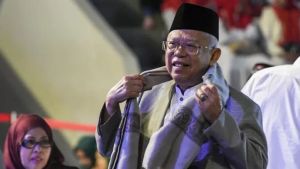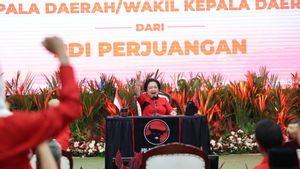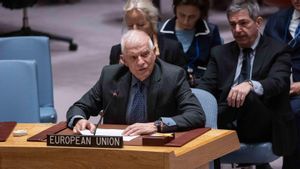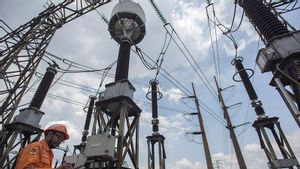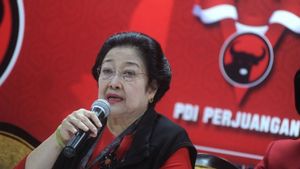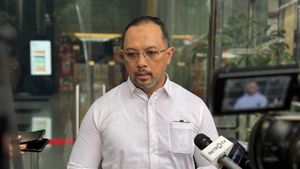JAKARTA - The Indonesian House of Representatives has decided to cancel the revision of the Pilkada Law (RUU) which is not in line with the decision of the Constitutional Court (MK).
The speed of the DPR's response to the controversy over the Pilkada Bill is considered a step by the council to prioritize the aspirations of the people.
"We cannot turn a blind eye, the DPR's quick response to the issue of the rejection of the Pilkada Bill yesterday shows the DPR listening to the voice of the people," said political communication observer Silvanus Alvin in his statement quoted Monday, August 26.
Although the Pilkada Bill was initiated by the Legislation Body (Baleg) of the DPR, the fact that many members of the council did not attend the plenary meeting which was planned to ratify the Pilkada Bill was also considered by Alvin to show that in fact the majority of council members gave rejection.
"The gap in reaching the quorum in the plenary session last Thursday, coupled with the increasing number of votes that refuse, clearly shows that many members of the DPR are aware of the controversial changes proposed," he said.
As is known, the public is busy opposing the DPR Baleg's plan to revise the Pilkada Law because it is considered contrary to the constitution. Because Baleg does not accommodate the Constitutional Court's final and binding decision.
SEE ALSO:
The Constitutional Court's decision changed the threshold for nomination of regional heads through Decision Number 60/PUU-XXII/2024. The Constitutional Court decided that the threshold for nomination of regional heads (threshold) would no longer be 25 percent of the votes acquired by political parties or coalitions of political parties resulting from the previous DPRD legislative election, or 20 percent of DPRD seats.
In its decision, the Constitutional Court stated that the threshold for nomination of regional heads by political parties is equivalent to the threshold for nominating regional heads from independent/non-party/individual channels. This means that every political party can nominate candidates so that the Pilkada can lead to many variations in regional head candidates. The Constitutional Court's decision is also considered to close the opportunity for the emergence of an empty box phenomenon in the regional elections.
In addition, the Constitutional Court emphasized that the requirements for the age of the regional head candidates were calculated since the appointment of the person concerned as a candidate for regional head by the KPU, not during the inauguration, such as the decision of the Supreme Court (MA). Even so, Baleg had decided not to accommodate the Constitutional Court's decision regarding the threshold and chose to use the Supreme Court's decision rather than the higher Court regarding the terms of age for regional head candidates through the revision of the Pilkada Law.
The revision of the Pilkada Law is planned to be ratified in a plenary meeting on Thursday, August 22, but it was canceled because the plenary meeting did not meet the quorum so it could not be held. Many DPR members chose not to attend the Plenary Meeting.
"The number of council members who were not present at the plenary meeting to ratify the Pilkada Bill is a form of their attitude to uphold democracy in Indonesia," said Alvin.
"This rejection must be seen as a strong signal that every legislative action must prioritize the needs and rights of the people above the interests of the political elite," continued the Lecturer of Communication.
After the Plenary Meeting was canceled, the DPR decided not to revise the Pilkada Law. This is because there have been many rejections from the community. In the aftermath of Baleg's plan, various elements of society including students and academics and celebrities took to the streets to hold demonstrations.
Alvin also highlighted that there were actually quite a number of DPR members who voiced rejection of the Pilkada Bill plan. Therefore, the DPR decided to cancel the ratification of the Pilkada Law amendment in response to the public's rejection.
"Apresiasi kepada anggota DPR yang telah menunjukkan keberatan luar biasa dengan menolak revisi yang diajukan oleh Baleg yang banyak dianggap tidak memenangkan ke willan rakyat yang sebenarnya," kata Alvin.
These members have shown commitment to democratic principles by rejecting efforts that seem to benefit certain elite interests more than the interests of the wider community, continued Doctor Media and Public Relations of the University of Leicester, England.
A number of members of the DPR were known to come down during a demonstration last weekend to hear the aspirations of the people. Not only that, Deputy Speaker of the House of Representatives Sufmi Dasco Ahmad also visited Polda Metro Jaya to ask the Police to release the crowds of demonstrations who were arrested.
They really hear the people's hopes and defend elements of society who take to the streets like students to voice their aspirations. The DPR ensures that the State guarantees freedom of expression which is part of democracy, "said Alvin.
The author of the book 'Political Digitization: Reflection and Communication Dynamics' also appreciated the message from the Speaker of the House of Representatives, Puan Maharani, who emphasized that the DPR was carrying out people's sovereignty democratically. Alvin also praised Puan for thanking all elements of society for the dynamics that occurred regarding the Constitutional Court's decision on the Pilkada Law.
"In the current political dynamics, the members of the council also need to hear directions from the chairman of the DPR, Puan Maharani, who firmly states that members must obey the Constitutional Court's Decision," added the millennial lecturer.
SEE ALSO:
On the other hand, Alvin assessed that the DPR's commitment to accommodate the aspirations of the people was seen by the immediate meeting with the KPU to revise KPU Regulation (PKPU) Number 8 of 2024 concerning the nomination of regional heads for the 2024 Pilkada. Commission II of the DPR approved the revision of PKPU 8/2024 which is in line with the Constitutional Court's decision.
"The positive thing has actually been shown by Commission II of the DPR by ratifying the PKPU in accordance with the Constitutional Court's Decision. They follow and are in line with the voices of the people," said Alvin.
Alvin hopes that the members of the council will not only accommodate the aspirations of the people when there is a big issue that sparked action.
"Apart from being a habit, we must continue to take a stand and make decisions that are in line with what the people want," he added.
Previously, Deputy Speaker of the House of Representatives, Sufmi Dasco Ahmad, confirmed that the ratification of the revision of the Pilkada Law was canceled. Dasco said that the Constitutional Court's decision was valid for the registration of the Pilkada on August 27, 2024.
"That today is August 22, Thursday at 10:00 after experiencing a 30-minute delay, it has been knocked out that the revision of the Pilkada Law cannot be implemented. This means that today the revision of the Pilkada Law has been canceled," explained Dasco, Thursday, August 22.
"By not passing the revision of the Pilkada Law on August 22 today, what is valid at the time of registration on August 27 is the result of JRMK's decision," he said.
The English, Chinese, Japanese, Arabic, and French versions are automatically generated by the AI. So there may still be inaccuracies in translating, please always see Indonesian as our main language. (system supported by DigitalSiber.id)
